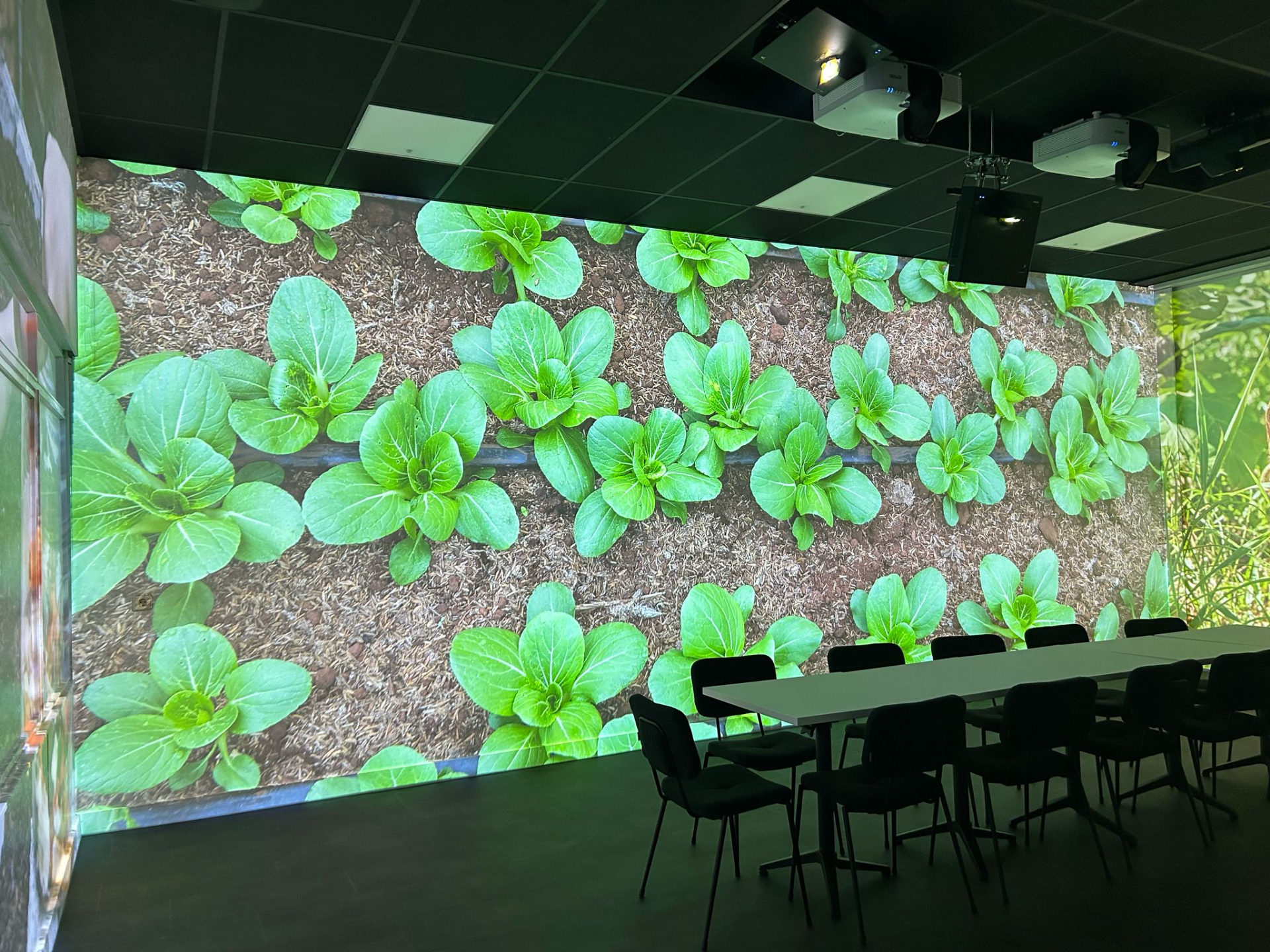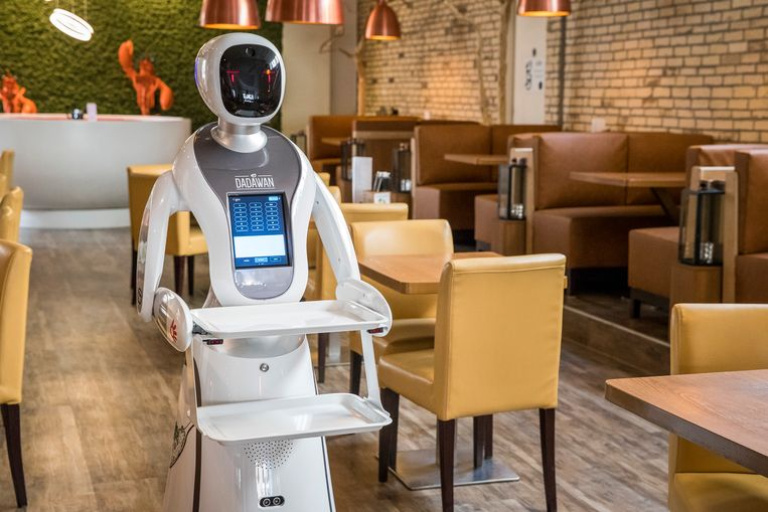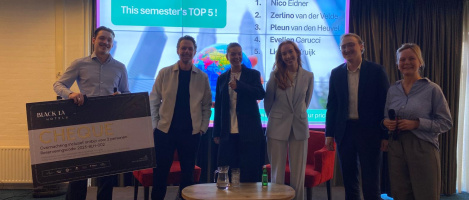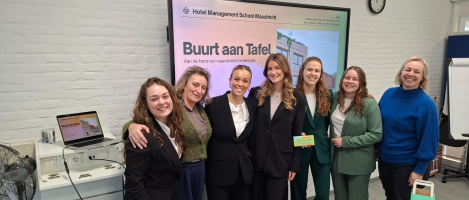The mission of the research centre is to advance knowledge and support the development in two distinct areas of the future of food:
Sustainable Food Experience Innovation
In the theme Sustainable Food Experience Innovation, we develop innovative, healthy and sustainable food and hospitality interventions for consumers to stimulate them to make more sustainable and health conscious food choices.
This research line benefits from the expertise of the former research centre on Gastronomy and further integrates the established knowledge on Taste to involve innovations that drive food experiences of consumers.
Key topics within this area of research include the role of technologies in food experiences (e.g. immersive technologies (XR), use of biometric measurement technologies for complementing research methods); the design and testing of multi-sensory experiences that create engaging food environments to stimulate sustainable consumption behavior; and approaches to sustainable consumer experience design to foster innovation.
This research line is characterized by consumer-centric experience innovations in the food context that result in the creation of emotion engaging experiences meaningful to consumers.
Food Service Transformation
The theme food service transformation deals with disruptors and initiatives for transformation across the food service sector.
In this theme we explore and anticipate on current challenges and upcoming opportunities in the food service industry that will impact segments across the industry (i.e. restaurants & bars, hotels, educational institutes) and consequently the consumer experience.
Key topics within this theme include food service efficiency through technological disruptors such as the adoption of artificial intelligence in food service and food service robots; local sourcing and opportunities to enhance transparency across the food supply chain; and anticipating and responding to global phenomena (e.g. COVID-19) impacting the food service industry; all of which are expected to influence consumer food experiences explored in theme line sustainable food experience innovation.
Projects
Immersive Sustainable Food Experience Design
We live in a society that is increasingly dominated by technology-mediated interactions and consumption of experiences. It has opened pathways to innovative immersive technology concepts in the food and dining context, contributing to the development of a consumption-oriented society.
This project addresses the challenge how to stimulate consumers through immersive technology designs to make conscious choices leading to more sustainable behaviors in the food and dining context.
This project evolves around designing and testing Extended Reality (XR) technology-mediated immersive food experiences in the food and dining context to stimulate sustainable food consumption behavior. It includes the use of complementing measurement tools to test the effectiveness of XR designs to make better XR technology design choices that can stimulate change in consumption behavior.
CELTH study: Extended Reality for Single-Use Plastics Reduction in Hospitality
CELTH study: “Extended Reality for Single-Use Plastics Reduction in Hospitality: Piloting a Digital Twin in an immersive CAVE for Plastic Reduction Practices and Behaviours in Kitchen Operations”
Danny Han and Malu Boerwinkel are teaming up with colleagues from NHL Stenden and Breda University of Applied Sciences to work on a project aimed at reducing single-use plastics in hospitality kitchens. They are using immersive extended reality (XR) technology in their research lab to create a virtual space where small hospitality businesses can explore and redesign their kitchen processes without disrupting their normal operations.
The project will produce:
- A video recording showing daily kitchen activities, highlighting plastic use
- A digital replica (digital twin) of a selected hospitality kitchen projected in the XR environment
- One or more behavior-based solutions to reduce plastic waste, using the 3R (Reduce, Reuse, Recycle) approach.
- An academic paper or industry report
- A webinar and a live event to share the findings
RAAK SIA Lectorenplatform: Hospitality, Tourim, Innovation and Technology Expert Network
The HTIT-EN (Hospitality, Tourism, Innovation & Technology Experts Network) is a collaborative initiative that brings together leading professors and researchers from five top Dutch academies in hospitality and tourism:
• Hotelschool The Hague
• Hotel Management School Maastricht (Zuyd)
• Breda University of Applied Sciences
• Saxion University of Applied Sciences
• NHL Stenden University of Applied Sciences
Together, the platform shares a clear ambition: to explore how the hospitality and tourism sector in the Netherlands—known for its strong social and economic influence—can harness emerging technologies to drive meaningful change in society.
From robotics and artificial intelligence to immersive experiences, the hospitality and tourism industries are positioned to make them powerful drivers of societal change through testing and scaling technology-driven solutions that improve everyday life and work.
By combining the academic strengths in future thinking, digital transformation, and innovation management, and by working closely with educational institutions, businesses, and industry groups, the lectorenplatform aims to make Dutch hospitality and tourism a driving force for positive, technology-powered societal impact.
Exploring the Future of Robotics in Hospitality
This research pipeline, led by Dr. Kimberley van der Heijden, investigates how service robots—such as Pepper—can be integrated into the food service and hotel settings and measures their effect on guest and employee experiences.
As robots are increasingly introduced in the service industry, understanding how humans interact with complementing robot capabilities is vital. Dr. van der Heijden's research pipeline focuses on identifying which humanistic and utility-based features of service robots positively influence guests’ experiences and which features may create discomfort, confusion, or even harm the quality of interaction in specific service encounters. This research pipeline aims to support hospitality businesses in making informed decisions about how to effectively use and integrate service robots in their settings. The goal is to support innovations through service robots that genuinely contribute to memorable, pleasant, and human-centered high-touch experiences in hotels and food service.
PhD project: “Personalized Gastronomy – As a Tool to Promote Healthy and Sustainable Choices for a healthier society”
Silvia Gabriela Abreu e Silva, is working in collaboration between Zuyd University of Applied Sciences (HMSM) and Maastricht University (promotor) to explore how personalized gastronomy can help individuals make healthier and more sustainable food choices—without sacrificing pleasure.
The project investigates how individual sensory preferences (like taste and smell acuity) influence food acceptance and explores how meals can be tailored to suit those preferences. By understanding and predicting consumer taste profiles, hospitality professionals can design dishes that are both delicious and aligned with health and sustainability goals.
The research focuses on:
- Mapping individual sensory profiles and their impact on food choice
- Testing personalized meals in real-world restaurant settings
- Exploring the role of environment (music, lighting, etc.) in influencing food experience
- Engaging hospitality students in co-creating new gastronomic education materials
The project will result in:
- Practical guidelines for implementing personalized gastronomy in hospitality
- Tools to help design healthier, more appealing menus
- Educational modules integrated into the hospitality curriculum at Zuyd
- Academic publications and industry-facing presentations
This research contributes to solving societal challenges like obesity, food waste, and dietary change—by making healthy food simply more enjoyable.
Purpose through ethically meaningful experiences
Danny Han and Malu Boerwinkel have collaborated with colleagues from Institut Lyfe in Lyon for a research paper on ethically meaningful experiences. This study explores how hospitality businesses—like restaurants and hotels—can create experiences that feel both enjoyable and ethically meaningful to guests. Traditionally, corporate social responsibility (CSR) in hospitality focused on rational appeals, like informing guests about eco-friendly practices. But this research highlights the power of emotionally engaging experiences in shaping ethical perceptions. Through interviews and a virtual restaurant experiment in the XR space of our Food Experience Lab, they identified two key design elements that help guests feel ethically connected:
- Social connection (like warm and meaningful interactions with service staff)
- Information transparency (clear communication about the ethical choices behind services, such as sourcing local ingredients from a permaculture garden).
The study shows that social connection alone can make experiences feel more ethical and meaningful, while transparency boosts that feeling, especially when connection is weak. The findings support the idea that guests often feel rather than logically think through ethical decisions, aligning with newer psychological models of decision-making. For businesses, the takeaway is clear: creating authentic, emotionally resonant experiences—not just promoting CSR—can enhance guest satisfaction and support sustainable practices. Ultimately, this shifts the focus from asking guests to make sacrifices for ethics, to designing experiences where ethical choices are naturally rewarding and memorable.

3D Food Printing in Foodservice
In a rapidly evolving food landscape, emerging technologies like 3D food printing (3DFP) offer new possibilities to rethink how food is designed, produced, and experienced. 3DFP holds the potential to address societal challenges related to health, sustainability, and personalization in gastronomy.
Building on the structured framework presented in our 2024 paper "The 3D Food Printing Pyramid of Gastronomy: A structured approach towards a future research agenda" (Meijers & Han, 2024), our current research explores how 3DFP can be integrated into real-world gastronomy to create meaningful, sustainable dining experiences. The pyramid outlines a three-level approach: from technical advancements to personalized gastronomy, and to the creation of sustainable gastronomic experiences. It provides direction for future research that bridges technological innovation and societal impact. In this context, we are currently conducting an experimental study focused on the industry perspective of implementing 3DFP in foodservice environments.
Crucially, we embed this research into education through Community Involvement Projects (ComIn) where students collaborate directly with the Research Centre Future of Food to co-create and prototype future-oriented food concepts. These projects not only contribute to the research agenda but also empower students to engage with food innovation in a hands-on, interdisciplinary setting.
Together, this work advances our understanding of 3DFP as a design and communication tool for sustainable gastronomy, and paves the way toward practical, scalable applications in the foodservice industry.
List of publications
2024
- Dieck, M. C., Han, D. I. D., & Rauschnabel, P. A. (2024). Augmented reality marketing in hospitality and tourism: a guide for researchers and managers. International Journal of Contemporary Hospitality Management.
- Meijers, M. G., & Han, D. I. D. (2024). The 3D Food Printing Pyramid of Gastronomy: a structured approach towards a future research agenda. International Journal of Gastronomy and Food Science, 100969.
- Han, D. I. D., & Orlowski, M. (2024). Emotional responses to narrative content: A comparative study on consumer food choice intentions. Computers in Human Behavior, 155, 108191.
- Mitas, O., Han, D. I. D., Struijer, B., Willems, L., & Chatwick, T. H. (2024). Taking pleasure in distinction: Unlocking specialty coffee preference. Journal of Global Business Insights, 9(1).
2023
- Boerwinkel, M., Gabriela, S., e Silva, A., Meijers, M., & Han, D. I. D. (2023). Future of Food and Menu Design: Leading question: What does the menu of the future look like?. In Critical Questions in Sustainability and Hospitality (pp. 87-96). Routledge.
- Han, D., Melissen, F., & Haggis-Burridge, M. (2023). Immersive experience framework: a Delphi approach, Behaviour & Information Technology, https://doi.org/10.1080/0144929X.2023.2183054
- Vadam, C., Hoek, I., McCann, S., Lipkin, H., Perera, C., van der Veeken, R., ... & Han, D. I. D. (2023). From Wellness to Wellbeing: Leading question: What is the path to stakeholder wellbeing?. In Critical Questions in Sustainability and Hospitality (pp. 97-109). Routledge.
- Vadam, C., Perera, C., van der Veeken, R., Innocenti, M., Lipkin, H., McCann, S., ... & Han, D. I. D. Return on Sustainability Investments: Leading question: Is sustainability paying off?. In Critical Questions in Sustainability and Hospitality (pp. 209-218). Routledge.
- Han, D. I. D., Melissen, F., & Haggis-Burridge, M. (2023). Immersive sustainable food experience design. Pure, Breda University of Applied Sciences.
- Jung, T., Cho, J., Han, D. I. D., Ahn, S. J. G., Gupta, M., Gopal, D., ... & Tom Dieck, M. C. (2023). Metaverse for service industries: Future applications, opportunities, challenges and research directions. Computers in Human Behavior, 108039.
- Sung, E., Han, D. I. D., Choi, Y. K., Gillespie, B., Couperus, A., & Koppert, M. (2023). Augmented digital human vs. human agents in storytelling marketing: Exploratory electroencephalography and experimental studies. Psychology & Marketing, 40(11), 2428-2446.
2022
- Han, D., Abreu e Silva, S., Schröder, K., Melissen, F., & Haggis-Burridge, M. (2022). Designing immersive sustainable food experiences in augmented reality: a consumer participatory co-creation approach. Foods, 11(22), 3646.
- Han, D., Boerwinkel, M., Haggis-Burridge, M., & Melissen, F. (2022). Deconstructing Immersion in the Experience Economy Framework for Immersive Dining Experiences through Mixed Reality. Foods, 11(23), 3780.
- Hilken, T., Mahr, D., & Han, D. (2022). Building customer loyalty with augmented reality: current and future trends. Handbook of Research on Customer Loyalty, 274-290.
- Tom Dieck, M. & Han, D. (2022). The role of immersive technology in customer experience management, Journal of Marketing Theory and Practice, 1-12. (Outstanding Paper Award Journal of Marketing Theory and Practice).
- Han, D. I. D., Bergs, Y., & Moorhouse, N. (2022). Virtual reality consumer experience escapes: preparing for the metaverse. Virtual Reality, 1-16.
- Sung, E., Han, D. I. D., & Choi, Y. K. (2022). Augmented reality advertising via a mobile app. Psychology & Marketing, 39(3), 543-558.
- Sung, E. C., Han, D. I. D., Bae, S., & Kwon, O. (2022). What drives technology-enhanced storytelling immersion? The role of digital humans. Computers in Human Behavior, 132, 107246.
- Tuomi, A., Tussyadiah, I., Han, D. I. D., & Ascenção, M. P. (2022). Implications of Cellular Agriculture for Hospitality and Tourism Management Research: Sustainable Development Goal Perspective.
2021
- Sung, E. C., Bae, S., Han, D. I. D., & Kwon, O. (2021). Consumer engagement via interactive artificial intelligence and mixed reality. International journal of information management, 60, 102382.
- Tom Dieck, M. C., & Han, D. I. D. (2021). The role of immersive technology in Customer Experience Management. Journal of Marketing Theory and Practice, 1-12.
- Weber-Sabil, J., & Han, D. I. D. (2021). Immersive Tourism-State of the Art of Immersive Tourism Realities through XR Technology.








